Our Charlotte Mason Homeschool Sixth Grade Year: A Recap

(Please note that I have linked to the book lists on the AO website to respect their licensing terms and the hard work they’ve put into such an amazing curriculum that they offer for free. Books that use affiliate links here are not listed on the AO website.)
It is much to be wished that thoughtful mothers would more often keep account of the methods they employ with their children, with some definite note of the success of this or that plan.
CHARLOTTE MASON (HOME EDUCATION)
See our plans for this year here.
It’s time for our annual school year recap! We finished on June 7th but then had a week at our horse camp (at which I also volunteered this year), and last week we did our exams, so I wasn’t able to get around to writing all of this out until late last week.
Overall it was a good year. I saw progress in a few areas, but his time-management skills were most encouraging. He had quite a few more readings this year than last year that he had to do on his own, and though he fell behind during a few weeks, by the end of the year, he was becoming disciplined enough that he decided to get them all done early in the week so he didn’t have to do them all on Friday afternoon.
He also took charge of his math, which he is now doing primarily on his own (see notes below), and told me that even if we didn’t do math through the summer (which is our standard practice and which we are doing again this year), he would do it on his own. I am thankful for this initiative.
Here’s our Year 6!
Morning Time
Summer
In the Fall of the Year
Winter
In the Spring of the Year
Book of Virtues
Morning Time Resources
Our routine:
- Prayer
- Doxology
- Music
- Monday/Wednesday: hymn
- Tuesday/Thursday: folksong
- Reading/Riches
- Monday: a single reading from we finished courage and moved on to self-discipline)
- Tuesday: Picture Study (see below for more details)
- Wednesday: ten minutes from one of the seasonal books listed above
- Thursday: Composer Study (see below for more information)
- Lord’s Prayer
- Benediction
Our Morning Time stayed pretty much the same this year, which means we finally hit a good rhythm for it. We ended up finishing In the Spring of the Year just before the end of the school year, so I’ll have to find a different book for us next spring. I’ll write more about that in my Year 7/Year 4 planning posts.
Bible
Bible Book List Here and Here
The Student Bible Atlas
SPCK Bible Atlas
Bible Resources
There was a lot more Bible reading this year than in years past, which was an adjustment for us both as I still do the assigned Bible readings with him. My original plan was to do the OT reading on Monday, NT on Tuesday, Psalm on Thursday, and Proverbs on Friday. However, the OT readings were so long that I ended up spreading those out over several days in addition to the other readings.
I did not end up using any kind of commentary for any of the readings, mainly because I didn’t have time to do that additional pre-reading. I don’t know if this was a good thing, but since the commentary only covered part of the readings anyway, I don’t think we missed much by not including it.
I appreciated that they added Proverbs and Psalms this year, but getting through all of Leviticus’s Tabernacle/sacrifice/feast laws and regulations was challenging. We both learned a lot from them and understood the emphasis on God’s holiness and the Israelites as a set-apart people, but B struggled with his habit of attention during those readings. AO changed the Bible reading schedule for Year 7, so it’s now a repeat of what we read this year. I’ll have to decide how to keep going with that.
History & Biography
History Book List Here
Biography Book List Here
History Resources
Vinegar Boy
I read The Story of Mankind, The Story of the World Part IV, Answering the Cry for Freedom (we did not read the chapter on Sally Hemings due to the adult nature of the topic), and August Caesar’s World to him. He read The Story of the Greeks and The Story of the Romans on his own and narrated them to me, usually verbally.
We finished the modern age in Term 1 and then went back to the beginning of the Roman Empire in Term 2. This was fascinating, and I appreciated how this tied in so well with the Plutarch and various Shakespeare readings we’ve done. B has struggled at times with narrating the Genevieve Foster books just because they’re so dense, but he did not have any problems with Augustus Caesar and was engaged with the book. The only thing neither of us enjoyed was the readings about the Eastern religions, which were also covered in Age of Fable.
As I mentioned at the beginning of the year, we skipped this year’s readings of Trial and Triumph and Genesis: Finding Our Roots. AO’s suggested alternative was Ben-Hur, but after the first term, I knew we would not have enough time for that, so I chose Vinegar Boy instead, and I’m so glad I did. This was a fantastic book for us, and I highly recommend it.
I also added these books for diversity:
A Place Where Sunflowers Grow
Peppe the Lamplighter
Saltypie: A Choctaw Journey from Darkness into Light
The Pot that Juan Built
The Little Rock Nine
Tiny Stitches: The Life of Medical Pioneer Vivien Thomas
Henry & The Kite Dragon
Passage to Freedom: The Sugihara Story
The Librarian Who Measured the Earth
I did not require narration for these but added them to our free reads box, and both kids read them multiple times.
Book of Centuries
He still struggles with the idea of entering dates into his Book of Centuries, as I think it’s too abstract for him. I requested that he enter at least three events per week, and in the last week of each month, I have him do a drawing. This system has worked well for us, so we’ll continue this next year.
Literature
I read Age of Fable to him. He read The Hobbit, Animal Farm, The Iliad for Boys and Girls, and The Odyssey for Boys and Girls on his own and narrated them to me, either verbally or typed.
We caught up on Age of Fable at the end of the year, so we’re set to go into Age of Chivalry next year. It was interesting to go from the Greek/Roman mythology into the Eastern and then Scandinavian myths as well. B enjoyed The Hobbit and Animal Farm.
Shakespeare
Term 1: Folger Shakespeare Library: Henry V (and Arkangel Recording)
Term 2: Folger Shakespeare Library: Coriolanus (and Arkangel Recording)
Term 3: Folger Shakespeare Library: The Merchant of Venice (and Arkangel Recording)
Shakespeare Resources
I discovered halfway through Term 3 that all of the Arkangel recordings are also on Hoopla, which we get through our library, so I won’t need to buy them anymore. This system of printing out the free Folger’s plays and then listening along with the Arkangel recording has continued to work so, so, so well for us.
While he didn’t struggle narrating while we were listening to the plays, he did struggle writing something for Henry V and Coriolanus for the end-of-term exams. Whether he was just hesitant to write, which continues to be a challenge, or he really couldn’t remember, I’m not sure which may be the case. He did give a better recap for Merchant of Venice, which I think he also enjoyed more than the others.
Poetry
I read these to him, and he liked all of our poets this year, especially Langston Hughes.
Language Arts
Copywork
He finally picked some of his own copywork this term, but only when the copywork suggestions I offered to him ran out. Otherwise, he continued using his recitation pieces and the hymns and folksongs. His handwriting is still clear and easy to read but still pretty large. I’ve been trying to remember when I started writing smaller, and I think it was junior high, so I’m hoping that comes with time.
Spelling/Dictation
Spelling Wisdom Book 1
Post-it Page Markers
Spelling Resources
We’re almost through Spelling Wisdom Book 1! I feel like this way of approaching spelling has been a fantastic method, but I’m interested to see how it goes with his sister next year as she spells many words phonetically, which doesn’t always equal correctly.
He did struggle with the longer passages and was very vocal about not wanting to do them. We did them anyway. 😊
Grammar
Junior Analytical Grammar and Mechanics (JAG)
Grammar Resources
We finished the JAG book and moved on to Mechanics. The directions in the book were a little challenging to understand (which is why I think the people who owned it before us quit after the first unit). We finally figured out the proper way to do it, and it’s been smooth sailing since. He is enjoying mechanics more than he did the grammar book, but I think both have been very good at teaching these elements.
Repetition/Recitation
Ruminating on Recitation Article (read this first!)
Recitation Guidelines and Student Log (updated in 2021)
Recitation Resources
We kept up with our routine of him reading aloud his recitation pieces to me once daily with Old Testament on Mondays, New Testament on Tuesdays, Psalm on Wednesdays, and poem on Thursdays. He deferred to me again to pick the pieces, which worked well for us.
This is what he learned for recitation:
Term 1
OT: Genesis 28:10-22; Genesis 32:22-32
NT: Luke 19:28-40; Matthew 28:1-10
Psalm: 4
Poems: The Road Not Taken; A Prayer in Spring (both by Robert Frost)
Term 2
OT: Job 22:21-30; Exodus 6:1-11
NT: Acts 2:1-12; Acts 4:13-22
Psalm: 4 (I accidentally did not change this, so he got the same Psalm for two terms)
Poems: Primer Lessons; Fog (both by Carl Sandburg)
Term 3
OT: Proverbs 12:1-12; Leviticus 19:9-18
NT: Acts 9:1-12; Acts 10:34-43
Psalm: 9:1-11
Poem: Dreams; I, Too (both by Langston Hughes)
Typing
The Good and the Beautiful Typing Curriculum
His typing has definitely improved, and he finished book 1 and moved on to book 2. I feel like his written narrations are also improving and getting longer since I allowed him to type them instead of writing them. I had to ask him a few times if he could be more detailed, but overall I saw improvement in this area. As of the end of the year, he was typing two narrations each week. Usually, one was from The Storybook of Science, and the other was a reading of his choosing.
Foreign Language
Charlotte Mason Simple Spanish
Tierra: Tema 1 & 2
We did Charlotte Mason Simple Spanish in Term 1, and that worked well for us for the most part. The organization and layout were a little confusing to me, and I felt like I had too many different things to juggle at times, but that was probably more due to user error than the curriculum.
About halfway through Term 1, I was asked to test Tierra and we used that for the rest of the year. This one worked so, so well for us, and I’m excited that we got to use it first! If she continues to make new content for that curriculum, I fully intend to use it in the fall as well.
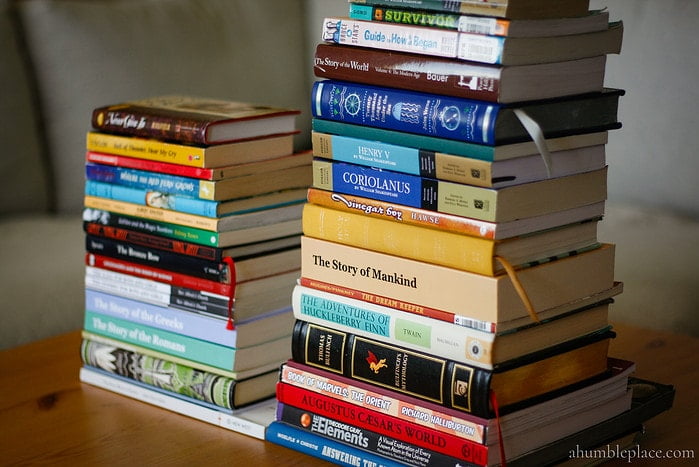
Geography
Geography Book List Here and Here
Book of Marvels: The Orient Video Companion*
AO Forum Year 6 Map Resources
Seterra Maps
Geography Resources
I read Book of Marvels and Long’s Home Geography to him. He read The Story of David Livingstone on his own and narrated it verbally to me.
We finished Halliburton in Term 2 (skipping the “Slave City” chapter), which was a little sad for me. I went to my very first Charlotte Mason retreat in 2017, and one of the workshops I attended was a geography immersion (taught by a woman who ended up becoming a very close friend of mine), and she used Halliburton for her example. I was so excited when we started it in Year 5, and now we’re done. Just like that. It was a great book for exploring the world.
For map drills, we did all of Europe in Terms 1 and 2, then moved on to Greece, and Africa in Term 3. I also found maps through the AO map resources link above for us to look at each week while we followed along with David Livingstone as he made his through Zambia, Malawi, and Tanzania.
We also finished Long’s Home Geography which we’ve been reading a little from every year since Year 1. So many lasts this year!
Scouting
I read this to him and his sister.
We all enjoyed the scouting book when we were able to make time for it, which, sadly, did not happen every week. In Term 1, we got through the Observation unit, and I had the kids do the test at the end during their exams. In Terms 2 and 3, however, we fell behind as the other units I chose required more prep work which I neglected to do. I hope to continue with this book next year and might suggest doing it with a friend, as I think it works better in larger groups.
Citizenship (Plutarch)
Plutarch Schedule Here
Plutarch Resources
Plutarch Maps
I read Anne White’s guides to him.
After putting Plutarch off for a year and being nervous about starting these lives last year, he is now one of our favorite subjects. It’s been so neat to see where B narrates something to me that he interprets in a different way than I did and, it turns out, also understands better than I did. I’m so glad this is part of our routine now!
Nature Study & Science
Nature Study & Science Book List Here
Term 1: Sabbath Mood Homeschool Science Guide – Chemistry
Term 2: Sabbath Mood Homeschool Science Guide – Weather
Term 3: Sabbath Mood Homeschool Science Guide – Physics-Energy
Storybook of Science (following the Sabbath Mood Homeschool Science Guides reading schedule)
Various books from the Sabbath Mood Homeschool living science books lists
Bruce and Stan’s Guide to How It All Began
I read Bruce and Stan’s Guide to How It All Began instead of It Couldn’t Just Happen to him. He read The Elements, The Sea Around Us: Young Reader’s Edition, Albert Einstein and the Theory of Relativity, Archimedes and the Door of Science, and Galileo and the Magic Numbers on his own and narrated either verbally or typed to me.
This was the most heavily-modified subject in our curriculum this year, as I did not use all of the AO books. We did start reading The Mystery of the Periodic Table at the beginning of the year, but I realized a few weeks into Term 1 that this book is scheduled for the Sabbath Mood Homeschool Form 3-4 Chemistry guide, which we’ll be doing next year, so I dropped it for now. I have since learned that I need to pay attention to this as there is some overlap between AO and SBH science but in different years.
I managed to get The Sea Around Us: Young Reader’s Edition from the library over and over and over again, sometimes with very long waits between checkouts, and we got through the whole thing. B said this was one of his favorite books for the year, so the extra effort was definitely worth it. The AO Advisory removed this book for Year 6 a few months ago (the non-Young Reader edition is now in Year 9), but I may still include it for C when it’s her turn for Year 6.
We replaced It Couldn’t Just Happen with Bruce and Stan’s Guide to How It All Began using Kathy Livingston’s helpful schedule on the AO forums. This was a tad more technical than B was comfortable with at times. Still, overall he now has a better understanding of the various debates surrounding creation and evolution, and most importantly, that God is the Creator of all.
He enjoyed the Theodore Gray Elements book (we also picked up his Machines book, which he loves), and all three science biographies were very interesting. I added Five Notable Inventors, Great Black Heroes as a free read as well.
Math
RighStart Level F
RightStart Level G
Math Resources
We finished RightStart Level F, and I got a bit of a surprise when we started Level G in that it was written for the student to do entirely on his or her own. So aside from occasionally helping him with a lesson he isn’t clear about, the only thing I really do is play math games with him.
I was initially sad about this. I know…that probably sounds crazy. Of the many conversations I’ve had with other homeschooling moms, math is often at the top of the least-favorite-subjects list. And some math curricula have the kids doing it independently from the beginning. But we’ve been using RightStart for six years, and I’ve done every single one of those lessons with him….until this year. A part of me is mourning the loss of that learning time with him.
On the other hand, the initiative I’ve seen him take in reading and completing all of the tasks related to his lessons, which is more than what he’s had to do in the past, is wonderful to see (and very encouraging to me!). I still set aside time during our morning lessons specifically for him to work on his math, and I’m available if he has any questions about the lessons, which he does occasionally. It’s been nice to have this quiet “working time” together.
I think my favorite part of it, though, is that every lesson in Level G includes a game to reinforce math concepts he has learned in the past but aren’t necessarily covered in the lesson. Math games actually happening in the past have been hit or miss for us as we so often didn’t have time to play them in addition to doing the lesson, which was a disappointment to him. Now that he’s doing the lesson on his own, we have time to make up for those lost games. Overall, I’m thankful for this change.
Art
Picture Study
Term 1: Leonardo da Vinci
Term 2: Art of the Yuan Dynasty
Term 3: John William Waterhouse
Picture Study Resources
I saw a lot of improvement in his picture study narrations this year, which was also encouraging. John William Waterhouse was especially fitting for this year as so many of his paintings include topics from Greek and Roman mythology, and we read many of these in Age of Fable and The Odyssey for Boys and Girls. B was able to get a few of these references immediately when he saw the painting.
Art Creation
Creating a Masterpiece
Art Creation Resources
We did two projects and started one (which we’ll finish over the summer) from Creating a Masterpiece this year. The first was a northern light scene with chalk pastels, the second was painting tiles with alcohol ink (definitely the favorite!), and the last one was a floral medley in watercolor. We have the subscription until August, so we may also try to do the caran d’ache project as well over the summer.
Music
Composer Study
Term 1: Richard Wagner
Term 2: Ralph Vaughn Williams
Term 3: Edvard Grieg
Composer Study Resources
Composer study is getting better but still proves to be problematic when it comes time for exams. I started playing our composer study selections from Plex on our TV after we ended our school day, and this would play for most of the afternoon. But the kids are usually off doing their own thing in their rooms, the basement, or outside, so they aren’t sitting and actively listening to the music. I also started playing it through Plex in the car on the way to our nature group or other outings, but it didn’t seem to stick. Ultimately, the most important thing about composer study is exposure, but it would be nice if they could remember more about it. I need to think about this more over the summer.
Hymn
Term 1: He Leadeth Me & Dear Lord and Father of Mankind
Term 2: How Sweet the Name of Jesus Sounds & What a Friend We Have in Jesus
Term 3: I’m Not Ashamed to Own My Lord & Sweet Hour of Prayer
Music Resources
I only changed the second song in Term 3 from Rock of Ages to Sweet Hour of Prayer because the latter was available earlier on the Folks and Hymns channel on YouTube. I have come to appreciate this resource so much as both kids are learning both songs each term well because we can sing along with her twice a week. I also signed up as a Patreon member and get the MP3s that way, so I have added that to our Plex playlist as well. When I plan for next year, I need to keep in mind that she releases the recordings just before each month, so only certain ones will be available at a given time.
Folksong
Term 1: Did You Go to the Barney & Waltzing Matilda
Term 2: The Mermaid & Poor Wayfaring Stranger
Term 3: Red River Valley & Crawdad Song
Music Resources
I didn’t make any changes to this schedule from the beginning of the year, and we used the Folks and Hymns channel on YouTube for this as well.
Just a little sidenote about both our folksongs and hymns, but especially the hymns: Lynn Bruce selected all of these last summer. When she passed away on February 18th after a 15-year battle with cancer, Poor Wayfaring Stranger was our folksong, and that, along with Red River Valley, often brought tears to my eyes as I thought of her.
Physical Education
Swedish Drill Revisited II
Swedish Drill Revisited III
Sadly, Swedish Drill was one of the things that fell off the schedule when life got busy, which it often did this year. In fact, the last month or so was a lot of trying to catch up and make sure we had the books that needed to be read by the end of the year taken care of. Since B is moving up to Form III next year, most, if not all, of the books that were scheduled for this year are not continued into next year, but most, if not all, of them offer preliminary information that is helpful to know for next year.
We did get out for quite a few hikes and events with our nature group, walks around the neighborhood, play dates, and of course, activities in the backyard, so being “active” did happen. But there was nothing intentional. I found an archery range that’s not too far from our house, and the fees are reasonable, so that may be my more intentional thing for the coming year.
Handicrafts
Survivor Kid
Sewing School
Handicrafts Resources
We managed to get through a little more than half of Survivor Kid, which all of us enjoyed. I’d like to try some of the things discussed, like making shelters and different ways to start a campfire, over the summer when we go camping. The section on how to respond when wild animals are near or attack was particularly helpful. We’ll finish reading this through the summer with no narrations required.
I left Sewing School as an option for B since he already did parts of it a few years ago, and he chose not to do it again. However, he made a few things with the woodburning kit he got for Christmas, including garden stakes for me, so we still had some hands-on activities.
Free Reads
From the AO Free Reads list specifically, he read the following books:
- Where the Red Fern Grows
- Roll of Thunder, Hear My Cry
- Number the Stars
- The Call of the Wild
- The Bronze Bow
Among many others that weren’t on the free reads list. I also read 20,000 Leagues Under the Sea and The Adventures of Huckleberry Finn to him before bed at night.
Exams went well for the most part, but I do see a few problem areas, specifically in geography and composer study, as I mentioned above, that I need to think about over the summer. I can’t believe I now have a junior higher!
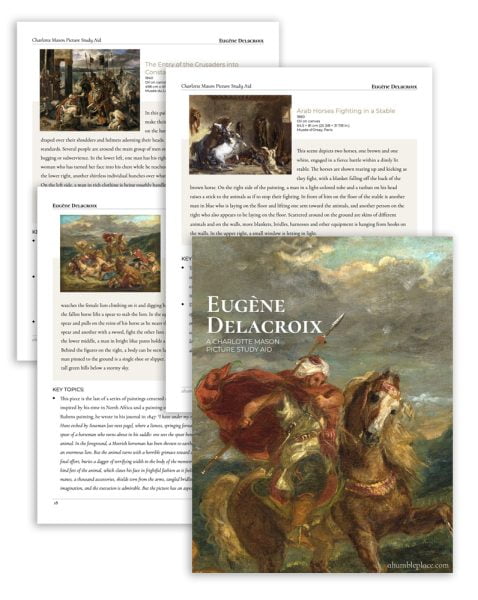
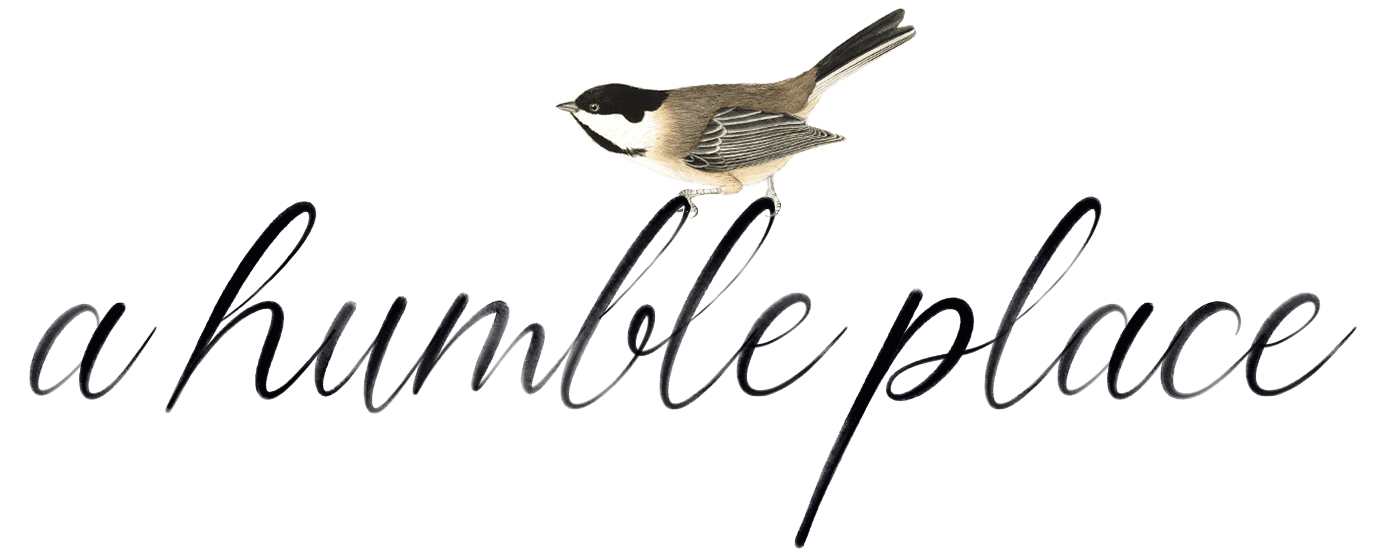
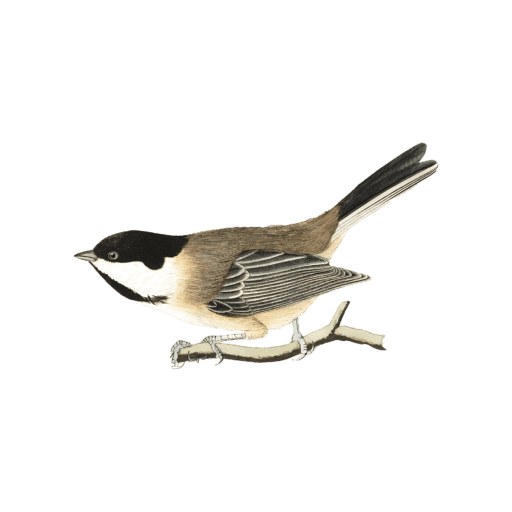

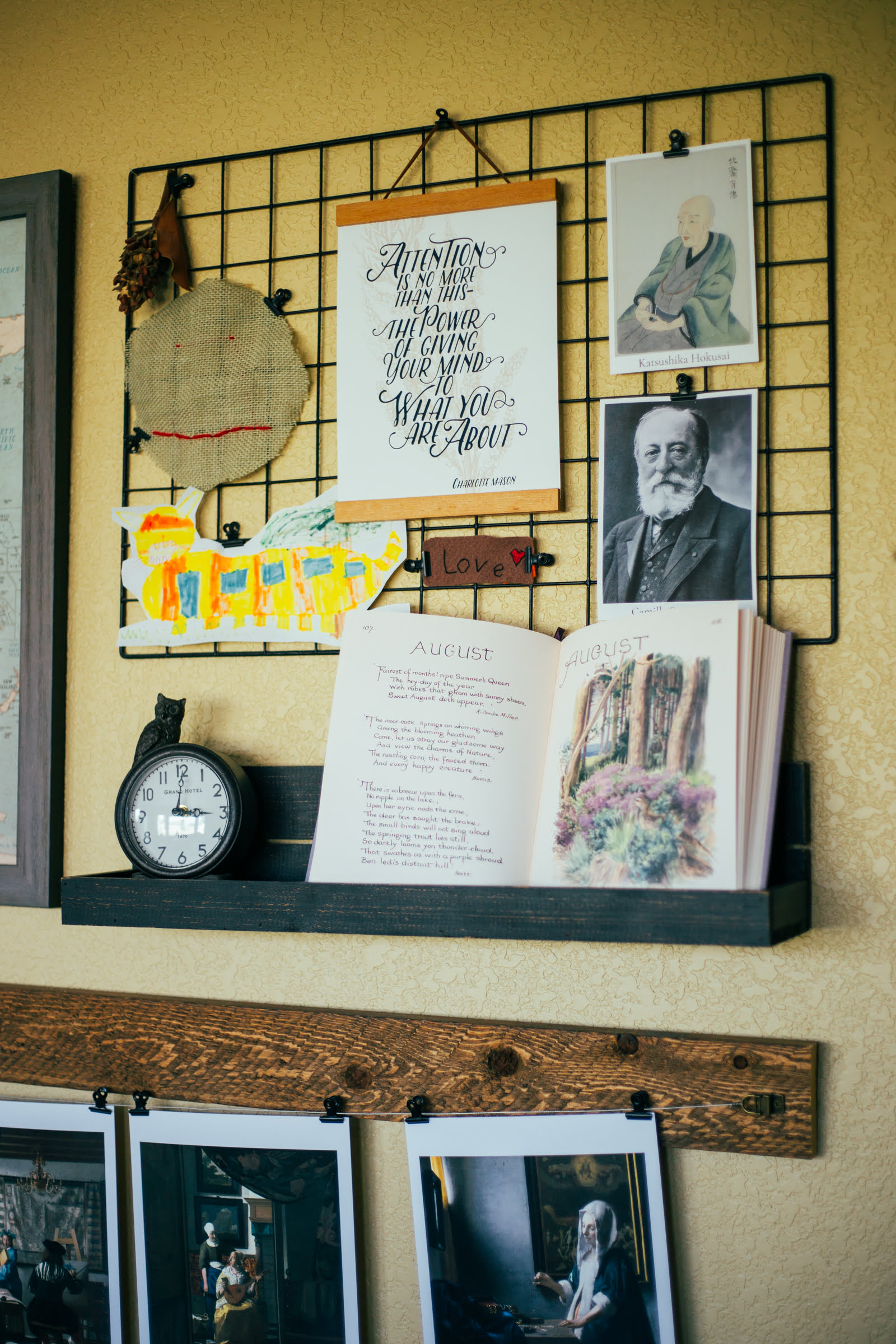




We have a speaker in our dining room and I schedule our composer to come on at 6pm, so we are usually at the table. The kids seem to pick up on it a lot – I have heard some made up songs to Grieg tunes.
I did this with Handel’s Messiah over Advent and we all memorized chunks of it!
Thank you for that idea, Amy! What do you use to do that? I need to look into if I could do something like that with Plex. 🤔
We got the Sonos bookshelf speaker from Ikea. (And promptly got a second one for the kids’ bedroom!)
I love your recaps because I have a student who is a year behind him! I have a question for BOC, he is starting one this year, and will similarly struggle with an open ended “mark dates and stuff” – do you have a time in his schedule set aside for BOC entries? Or 1x a day for 3 days during the week? Thank you!
I just put it on his school checklist for the week, and he knows he has to do three entries. Usually, he doesn’t do it until Friday which gives him more readings from which to choose.
Sorry, also for Shakespeare do you use just the text since he’s following along with the audio? Is the annotated text useful?
I print out the free Folger’s Shakespeare plays that are online (you can find the link to that in my Shakespeare resources post linked above) for him to read while we listen, and these are not annotated. For myself, I do get an annotated version, but I highly recommend not using an annotated version for your student as many Shakespeare plays have some adult themes that are explained in detail in the notes, which younger students especially probably don’t need to know. 🙂 But every family probably handles this differently!
Thank you so much! Super helpful!
Also, your link for the Shakespeare goes to the Folger’s Bookshop account where the bound and annotated versions are.
The free versions are actually referenced on the “Shakespeare Resources” post that I linked to under the list of individual books. On that page, I have a link to the website where I learned that all the texts are available online for free. You can see her post here: https://bookishfamily.blogspot.com/2022/03/teachingshakespeareforfree.html
I enjoyed reading about your 6th grade year. You covered a lot of ground. What an encouragement! I am starting round 2 this year. My two oldest daughters are 21 and 18. My two younger are almost 5 years and 4 months. So, we begin kindergarten in the fall.
Oh, sometimes I get a little sad that each year with my daughter is the last year that I’ll be doing that particular book list. I hope you enjoy round 2! 🙂
Thank you for all of the information that you share! I have a student who is a year behind yours and all the helpful hints have been, well, so helpful for us! I have a question regarding the grammar program – did you use the DVDs along with the workbook and teacher book?
You are welcome! I’m glad it’s all helpful! 🙂 We did not use the DVDs – just the books.